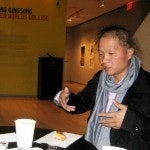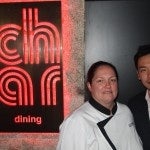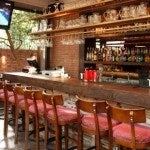Leading Figures From The Worlds Of Art, Design, Luxury And Culture#

Jiang Qiong'er
Jiang Qiong'er, CEO & Artistic Director of Shang Xia (Part One / Part Two) (September 22, 26)#
Since its launch last year, Jing Daily has closely followed Shang Xia (上下), the Shanghai-based high-end brand cultivated by the French luxury house Hermès. Situated at Hong Kong Plaza on Huaihai Road and led by artistic director and CEO, Jiang Qiong’er, Shang Xia is perhaps the only premium brand from mainland China that turns to age-old techniques and traditional and rare materials to create contemporary jewelry, apparel, porcelain and home decorations collections.
As Shang Xia prepared for the launch of its new “Human and Nature” collection and the debut of its exhibition at Sinan Mansions, Jing Daily editor Avery Booker sat down for a two-part interview with Jiang Qiong’er about Shang Xia’s first anniversary, the burgeoning appreciation for Chinese design now spreading among more sophisticated urban Chinese, and her plans for brand expansion.

Wang Qingsong, Contemporary Chinese Photographer (January 28)#
Last week, the artist Wang Qingsong, one of China’s top contemporary photographers, had a very busy week in New York. Launching his first New York solo exhibition, “When World Collide” at the International Center of Photography and taking part in an Art Salon at the China Institute, Wang received a warm welcome during a very China-centric week in which Chinese artists Hai Bo and Cui Xiuwen were respectively feted at Pace/MacGill and Eli Klein Fine Arts. Prior to the opening of “When Worlds Collide,” the Jing Daily team sat down with Wang to discuss his recent work, his new exhibition, and his future plans. Conducted in Mandarin, our interview shed light into the societal changes shaping Wang’s work, his thoughts on younger artists, and his observations on the Chinese art market as it climbs back towards a “second boom.”

Jean-Claude Biver, CEO of Luxury Watchmaker Hublot (Part One / Part Two) (April 20-21) Flying Pigeon David Laris
One of the highlights of the Prestige Brands Forum, held this past weekend at the China Europe International Business School in Shanghai, was a Q&A panel with the animated and enthusiastic Jean-Claude Biver, CEO and Chairman of the Swiss watch label, Hublot. A relative latecomer to mainland China, Hublot entered the market approximately 18 months ago, launching strong localized initiatives that included the appointment of Jet Li as the brand’s first Asian ambassador and a charity watch collaboration with author Han Han.
Jing Daily sat down with Biver on the sidelines of the forum for a discussion that touched on his plans for tackling the lucrative China market and his thoughts on the current state of luxury there. Transcription and original audio recordings by Jing Daily team.

Fei Wang: Designer of Luxury Sunglasses for Asian Faces (April 14)
"I’ve been interested in eyewear since I was little. I was always wearing glasses, since I was short-sighted. My dad wears glasses, all of my family are four-eyes…so I’ve always been interested in eyewear. What made me start doing what I do is because being [Asian], I can’t find glasses, especially good-styled glasses that actually fit our facial features. We normally have high cheekbones and low nose-bridges and the distance between the temple is slightly different than Caucasians. So it’s been my own frustration of not being able to find anything that fits me and also, design-wise, never being able to find anything I really like.
"I used to complain to people, why can’t I find things, then I thought I’d do it myself. So when it started, I actually looked for somebody who could make me bespoke glasses, and it took me a little while to find a manufacturer and do the design. It came out really well so I thought, “I can share this with other people.” That’s how the business came about, really."

Julie Donohoe and Ethan Tian of Shanghai Steakhouse CHAR (April 28)
Perched atop the Hotel Indigo on the Bund, CHAR is the newest in the ever-growing Shanghai restaurant scene. Focusing on premium-quality beef and seafood, CHAR is currently the only restaurant in China that imports Blackmore’s Wagyu beef from Australia, complementing its menu with fresh local produce. CHAR’s sophisticated interior, designed by Hirsch Bedner Associates, features a fine dining area, open grill kitchen, wine and cocktail lounge, two terraces, and three private dining rooms.
Executive Chef Julie Donohoe expertly applies her Australian training to CHAR’s menu, particularly in dishes like its signature “Char Indulgence,” which highlights the quality of Blackmore’s Wagyu, raised for 600 days using traditional Japanese methods. Among Shanghai’s steadily increasing number of steakhouses, CHAR is also unique in presenting touches such as a selection of handcrafted steak knives, as well as paintbrushes for applying sauces and selection of exotic salts.

Bayan Ferzandi and Patrick Conn of Flying Pigeon Bicycles (July 7)
Fueled by a wave of nostalgia sweeping China’s “post-80s generation“, home-grown Chinese brands established between 1949 and the country’s economic “opening” of the 1980s are starting to make a comeback. Looking to catch the opportunity, in recent years some enterprising individuals and companies have sought to “revive” moribund Chinese labels, aiming them squarely at the same young urban taste-makers coveted by Western and Japanese brands.
Interestingly, some of the more motivated individuals breathing new life into Chinese brands are not Chinese at all. From footwear maker Feiyue, run by a French team since 2006, to the sneaker and bag label ospop. and watchmaker Iguzzini, a handful of expat entrepreneurs are introducing retro Chinese brands to a new generation of consumers in China as well as abroad.

Alison Mary Ching Yeung, Creative Director of Mary Ching Footwear (April 25)
Founded by designer Alison Mary Ching Yeung in 2006, Mary Ching is one of the first high-end footwear and accessories brands to emerge from mainland China. Driven by Alison’s own eclectic aesthetic, Mary Ching seamlessly fuses Asian elements with vintage fashion without ever succumbing to “East Meets West” conventions. A regular sight at her flagship boutique on Ferguson Lane, which opened in 2009, Alison will appear next in London at the Walpole British Luxury Summit on May 17, where she will speak about the luxury market in the Greater China region.
Recently, Jing Daily spoke to Alison about Mary Ching and her thoughts on the potential for homegrown Chinese luxury brands.

Thomas Dariel, Shanghai-Based French Designer (July 19)
Moving to Shanghai from Paris in 2006, designers Thomas Dariel and Benoit Arfeuillere have quickly made names for themselves in the city’s thriving design community. Over the past five years, the duo’s design firm, Lime388–which they’re currently rebranding as Dariel & Arfeuillere–has been involved in some of the most striking and instantly recognizable interiors in Shanghai, from their work for famed Australian-Greek chef and restaurateur David Laris (Yucca, Funky Chicken, 12 Chairs) to the downtown golf lounge Ultra 18 and Fame nightclub.
Rex Jiang of Jing Daily recently met up with Thomas Dariel to discuss his firm’s current projects, the changing tastes of Shanghai’s design-savvy urbanites, and his plans for the future.

David Laris, Shanghai-Based Chef and Restauranteur (Part One / Part Two) (September 19-20)#
Since arriving in Shanghai nearly a decade ago, Australian chef David Laris has become a fixture in the city’s rapidly evolving fine dining scene. Arriving at Three at the Bund in 2002 from London, where he made a name for himself as the head of Sir Terence Conran’s flagship restaurant, Mezzo, Laris led his pioneering Laris Restaurant from 2003-2010, paving the way in terms of building the market for contemporary fine dining in Shanghai. In 2008, he founded David Laris Creates (DLC), which has provided consulting and development services for clients such as Swire’s Opposite House (Beijing) and East Hotel (Hong Kong (2010) and Beijing (2012)). Currently, Laris operates seven F&B concepts across 11 locations in Shanghai, including his Yucca Lounge, Mediterranean-infused Fat Olive, and most recently, 12 Chairs — “one of the smallest fine dining restaurants in China.” In October, Laris will open his first Chinese restaurant, Le Sheng (乐笙). Headed by a team of local Shanghainese chefs and featuring a curated list of Chinese teas, Le Sheng will be located on Shanghai’s Anfu Lu.
As part of our “Eye on Shanghai” series, Jing Daily editor Avery Booker recently sat down with David Laris at the Fat Olive in Sinan Mansions to discuss Shanghai’s evolution as a fine dining destination, the changing tastes of local diners, and the age-old question, “Beijing or Shanghai?”

Boxing Cat
Lee Tseng and Michael Jordan of Shanghai's Pioneering Boxing Cat Brewery (Nov. 2)#
Though its first modern brewery opened as early as 1903, until recent years beer culture in China started and ended with cheap, German-style light lagers. However, in the same way the tastes of many Chinese wine drinkers have progressed from inexpensive domestic plonk to high-priced imports, beer drinkers in China are becoming more receptive to the craft beer movement that has swept through North America and Europe over the last 30 years. With premium beer gaining a stronger foothold in cities like Shanghai and Beijing, domestic Chinese beer brands have even gotten in on the game, with Tsingtao launching its “Augerta” and “Yipin Pure” lines and Zhujiang taking a stab at Belgian-style witbier with “Supra White Beer.” Microbreweries, though, have until recently been largely absent from the China market, in stark contrast to Japan and Singapore.
But this, like everything in China, is changing quickly. Founded in 2008, Shanghai’s Boxing Cat Brewery is at the forefront of the Chinese craft beer scene, along with newer microbreweries like Beijing’s Great Leap Brewery and Slow Boat Brewery. To get a better sense of where China’s beer movement is and where it could be heading, Jing Daily recently sat down for a chat with Boxing Cat co-founder Lee Tseng and brewmaster Michael Jordan at the brewery’s Sinan Mansions location.